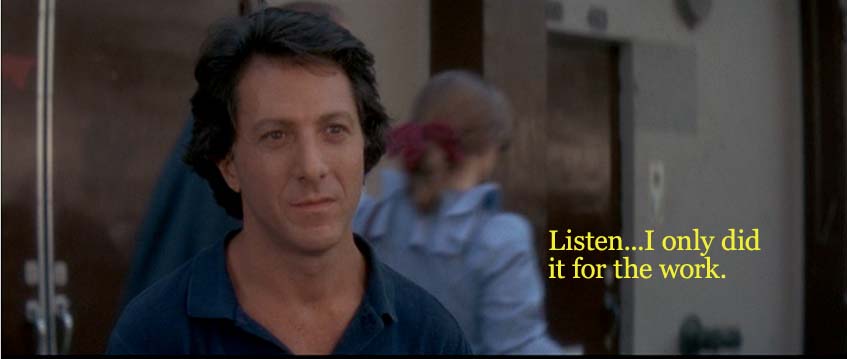
Lesson Twelve
Line: Listen, I only did it for the work.
Context: This particular phrasing comes from the end of the movie when Michael attempts to explain himself to Julie and win her back, but versions of it occur throughout. One of the first and most relevant to the quote above is in a scene in the opening montage that shows Michael practicing his art. He already has advised one of his acting students in an exercise to “make her work peripherally” and insisting to his class “There’s no excuse for not working.” But an audition speech reveals what work might mean to him.
Michael: Of course, they were doing it for dough the same as everybody does it for dough. But the question is in the last analysis is what were they doing for the dough? You and me were advancing our little non-Prussian careers. So when all hell broke loose and the Germans ran out of soap and figured, "What the hell? Let's cook up Mrs. Greenwald!" who the hell do you think stopped them?
Dustin Hoffman is famously Semitic, so the Holocaust reference above indicates the enactment of a massive betrayal of his own people in pursuit of careerism. In the play, they are Jews. In the movie, they will be his adopted tribe: actresses.
But while he is fanatically dedicated to craft, he can’t make a living at it. In scene after scene Michael fails to land jobs, whether from rejection (“We’re looking for somebody else, okay?”) or his own obstinacy (“Not with me as Tolstoy!”). He is, as his agent asserts, “a cult failure.” He is as dedicated to self-sabotage as Julie is to losing at love. Still he insists, “you gotta find ways to work.”
And cut to him slinging hash. So the first question in Tootsie becomes, “what will Michael do for the dough?”
Variations of the words “work,” “employ,” and “job” permeate the Tootsie script. The word work is even on the marquee in Michael and Jeff’s loft. The only word that comes close to being used as often is “love.” In the opening montage, when Michael challenges a female acting student, “What do you care about more than working?” she replies, “The part’s the most important thing, but sometimes love is, too.” This is a proposition he dismisses out of hand.
When Julie confides to Dorothy a romantic fantasy of an honest conversation with a man which ends, “we could do a lot of role playing, but the truth is I find you very interesting and would like to make love with you,” Michael uses the information to attempt to seduce her—while he is on a date with Sandy no less!
Michael, who doesn’t feel love until the end of the movie nevertheless uses “lovely” as his go-to adjective (“lovely blouse,” “lovely job—first rate,” “What a lovely, lovely room,” and “That’s lovely” to Julie’s dorky story about her wallpaper) and he is thanked for “a lovely evening by the fire.” Even the play Michael is bent on financing is called *Return to the Love Canal*, site of an infamous toxic waste dump. Which would decent nickname for his romantic life—Michael has an abysmal history with women.
And he is in Love Canal, literally with the actress he recklessly seduced and lost as a friend (though he did attempt to explain himself by exclaiming, “We never said ‘I love you’”), and now attempts to figuratively draw Julie in as well. Will she go for it? See Lesson Eleven to find out.
Usage: We should never use this phrase in earnest and beware men who do.Lesson Thirteen: “These are good people, George.”
Lesson Eleven: "And I lose, right?"